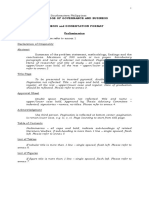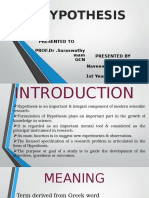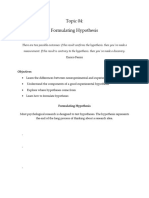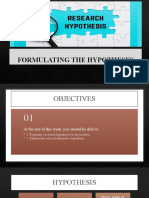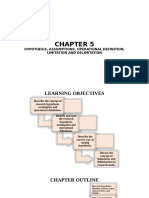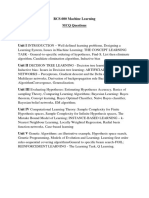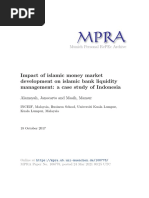0 ratings0% found this document useful (0 votes)
39 viewsResearch 2
A research hypothesis predicts the relationship between two or more variables and is formulated to be tested through a study. It should explain what the researcher expects to find. An assumption is an unexamined belief that forms the basis of research but is not empirically tested. There are different forms a hypothesis can take, including declarative (stating a relationship), null (stating no difference), question, alternative (anticipating a difference), and predication (stating expected principles).
Uploaded by
BabyCopyright
© © All Rights Reserved
Available Formats
Download as PDF, TXT or read online on Scribd
0 ratings0% found this document useful (0 votes)
39 viewsResearch 2
A research hypothesis predicts the relationship between two or more variables and is formulated to be tested through a study. It should explain what the researcher expects to find. An assumption is an unexamined belief that forms the basis of research but is not empirically tested. There are different forms a hypothesis can take, including declarative (stating a relationship), null (stating no difference), question, alternative (anticipating a difference), and predication (stating expected principles).
Uploaded by
BabyCopyright
© © All Rights Reserved
Available Formats
Download as PDF, TXT or read online on Scribd
You are on page 1/ 2
1.
A research hypothesis is a conjectural statement, a logical supposition, a
reasonable guess, and an educated prediction about the nature of the relationship
between two or more variables that we expect to happen in our study. Unless you
are creating an exploratory study, your hypothesis should always explain what you
expect to happen during your experiment or research. Remember, a hypothesis
does not have to be correct. While the hypothesis predicts what the researchers
expect to see, the goal of the research is to determine whether this guess is right or
wrong. When experimenting, researchers might explore some different factors to
determine which ones might contribute to the outcome. When a proposition is
formulated for empirical testing, we call it a hypothesis. Almost all studies begin
with one or more hypotheses. A hypothesis, more specifically, a research
hypothesis, is formulated to predict an assumed relationship between two or more
variables of interest. Hypotheses are stated in terms of the particular dependent
and independent variables that are going to be used in the study.
On the other hand, an assumption is an unexamined belief: what we think without
realizing we think it. Our inferences (also called conclusions) are often based on
assumptions that we haven’t thought about critically. A critical thinker, however,
is attentive to these assumptions because they are sometimes incorrect or
misguided. An assumption is a belief that forms one of the bases for the research.
This belief is not to be tested or supported with empirical data. Very often belief is
not stated in a research proposal. Explicit consideration of consistently applied
assumptions is useful for identifying the theoretical boundaries of any field of
research, as they serve as the foundation for a body of connected and interlocking
theories, shared and developed by a homogenous group or community of
researchers. In academic writing, an assumption is regarded as unexamined belief;
that is what we are considering without realizing it. Inarguably all research works
conclude based on the assumption that the authors have not critically examined.
Deciding what assumptions might arise in your readers’ minds is one of the
primary functions to be carried out when writing a research paper. Without a
doubt, assumptions are the foundation of any credible and valid research work. In
fact, without assumptions, research problems cannot be found as they determine
the conclusions that would be gotten from your research work.
3. Declarative hypothesis
• It generally states a relationship between the variables concerned. When the
researcher makes a positive statement about the outcome if the study, the
hypothesis takes the declarative form.
Example: There will be a significant difference in the instructional standards of
boys and girls in schools.
✓ Null Hypotheses
• The null hypothesis is the negative statement.
• It states that no significant difference exists between the variables concerned.
• Null Hypothesis can be tested statistically. So it is termed as statistical hypothesis.
• When declarative hypothesis tested statistically by converting them to null form
they are also called testing hypothesis.
✓ Question Form Hypotheses
• Researcher having finalized their problem of research, raise certain questions
which must be answered through their research.
• Research questions are generally called interrogative hypothesis.
✓ Alternative Hypotheses
• It is one in which a difference between two or more variables is anticipated by the
researcher.
• It can be non- directional or directional.
✓ Predication Form Hypotheses
• It is chosen because it allows the research worker to state principles which he
actually expects to emerge from the experiment.
• It is more useful action research studies.
4. Hypothesis: It would be affected in some ways like students would be
experiencing Sleeping Problems, Anxiety Disorders, Fatigue or Stress and etc.
You might also like
- Mathematics in The Modern World: Scatterplot of Stories (X) and Height (Y)100% (3)Mathematics in The Modern World: Scatterplot of Stories (X) and Height (Y)5 pages
- MODULE 2-L7 - Listing Research HypothesisNo ratings yetMODULE 2-L7 - Listing Research Hypothesis4 pages
- Hypothesis Development and Testing: Sendil Mourougan, Dr. K. SethuramanNo ratings yetHypothesis Development and Testing: Sendil Mourougan, Dr. K. Sethuraman7 pages
- Practical Research 2: Quarter 1 - Module 3No ratings yetPractical Research 2: Quarter 1 - Module 311 pages
- Hypothesis: Presented To PROF - DR .Saraswathy Mam GCN Presented by Naveen Kumar C N 1st Year M SC (N)100% (1)Hypothesis: Presented To PROF - DR .Saraswathy Mam GCN Presented by Naveen Kumar C N 1st Year M SC (N)60 pages
- PSYCH202 Topic 4 - Formulating HypothesisNo ratings yetPSYCH202 Topic 4 - Formulating Hypothesis7 pages
- How To Develop A Good Research HypothesisNo ratings yetHow To Develop A Good Research Hypothesis3 pages
- Las Practical Research2 Research HypothesisNo ratings yetLas Practical Research2 Research Hypothesis7 pages
- Tbi.b - (1) Research Assumption and Hypotheses100% (2)Tbi.b - (1) Research Assumption and Hypotheses5 pages
- 403706001-HYPOTHESIS-IN-RESEARCH-METHODOLOGY-docx-assignment-Copy-Copy-docxNo ratings yet403706001-HYPOTHESIS-IN-RESEARCH-METHODOLOGY-docx-assignment-Copy-Copy-docx30 pages
- Null Hypothesis and Alternative HypothesisNo ratings yetNull Hypothesis and Alternative Hypothesis6 pages
- HYPOTHESIS IN RESEARCH METHODOLOGY - Docx Assignment100% (1)HYPOTHESIS IN RESEARCH METHODOLOGY - Docx Assignment13 pages
- Hypothesis: A Research Hypothesis Is A Statement of Expectation or Prediction That Will Be Tested by ResearchNo ratings yetHypothesis: A Research Hypothesis Is A Statement of Expectation or Prediction That Will Be Tested by Research24 pages
- Viva-Vice Examinations For PH.D StudentsNo ratings yetViva-Vice Examinations For PH.D Students15 pages
- Hypothesis, Significance of The Study, Scope and DelimitationNo ratings yetHypothesis, Significance of The Study, Scope and Delimitation13 pages
- NURS 12 Module 12 Research Hypothesis and Assumptions First Semester AY 2021-22No ratings yetNURS 12 Module 12 Research Hypothesis and Assumptions First Semester AY 2021-227 pages
- Lesson 7 Hypotheses: Intended Learning OutcomesNo ratings yetLesson 7 Hypotheses: Intended Learning Outcomes30 pages
- Gray Yellow Modern Professional Business Strategy PresentationNo ratings yetGray Yellow Modern Professional Business Strategy Presentation8 pages
- Tutorials For Foundation Course - Research MethodologyNo ratings yetTutorials For Foundation Course - Research Methodology13 pages
- Chapter 5 Hypothesis Assumptions Operational Definition Limitation and DelimitationNo ratings yetChapter 5 Hypothesis Assumptions Operational Definition Limitation and Delimitation43 pages
- B.Sc. (Hons.) Biotechnology Core Course 13: Basics of Bioinformatics and Biostatistics (BIOT 3013) Biostatistics (BIOT 3013)No ratings yetB.Sc. (Hons.) Biotechnology Core Course 13: Basics of Bioinformatics and Biostatistics (BIOT 3013) Biostatistics (BIOT 3013)29 pages
- Department of Education: Learner'S Activity Sheet For Quarter 4, Week 2 Statistics and ProbabilityNo ratings yetDepartment of Education: Learner'S Activity Sheet For Quarter 4, Week 2 Statistics and Probability14 pages
- The Problem and Its Setting: Hypotheses/Assumption Scope and Limitation Significance of The Study Definition of TermsNo ratings yetThe Problem and Its Setting: Hypotheses/Assumption Scope and Limitation Significance of The Study Definition of Terms19 pages
- Part I. Give Your Answer Based On Your Basic Understanding in StatisticsNo ratings yetPart I. Give Your Answer Based On Your Basic Understanding in Statistics18 pages
- Department of Education: Learner'S Activity Sheet For Quarter 4, Week 4 Statistics and ProbabilityNo ratings yetDepartment of Education: Learner'S Activity Sheet For Quarter 4, Week 4 Statistics and Probability14 pages
- Ntroduction TO Ypothesis Esting: o o o oNo ratings yetNtroduction TO Ypothesis Esting: o o o o1 page
- Practical Research 3: Name: Jellycris France Andaya Section: 12 A&D Patriotic What I KnowNo ratings yetPractical Research 3: Name: Jellycris France Andaya Section: 12 A&D Patriotic What I Know14 pages
- Describe The Use of The Null Hypothesis and P-Value in A Drug TrialNo ratings yetDescribe The Use of The Null Hypothesis and P-Value in A Drug Trial2 pages
- Impact of Islamic Money Market Development On Islamic Bank Liquidity Management: A Case Study of IndonesiaNo ratings yetImpact of Islamic Money Market Development On Islamic Bank Liquidity Management: A Case Study of Indonesia23 pages
- Insult Detection Using A Partitional CNN-LSTM ModelNo ratings yetInsult Detection Using A Partitional CNN-LSTM Model9 pages
- Chapter One: Identifying and Stating The ProblemNo ratings yetChapter One: Identifying and Stating The Problem42 pages
- Var Model Validation: Laura Garc Ia Jorcano February 2018No ratings yetVar Model Validation: Laura Garc Ia Jorcano February 20189 pages
- PR2 LAS - Quarter 1 - Week 7 - October 25 - 29, 2021No ratings yetPR2 LAS - Quarter 1 - Week 7 - October 25 - 29, 20214 pages
- Fractional Factorial Experimental Designs in Marketing ResearchNo ratings yetFractional Factorial Experimental Designs in Marketing Research7 pages
- The Importance of Logical Thinking Ability of Secondary Level School Students in South DelhiNo ratings yetThe Importance of Logical Thinking Ability of Secondary Level School Students in South Delhi9 pages
